 Petzlover
PetzloverGull Terr is originated from Pakistan but Moscow Water Dog is originated from Russia. Gull Terr may grow 10 cm / 3 inches shorter than Moscow Water Dog. Gull Terr may weigh 10 kg / 22 pounds lesser than Moscow Water Dog. Both Gull Terr and Moscow Water Dog has same life span. Gull Terr may have less litter size than Moscow Water Dog. Gull Terr requires Low Maintenance. But Moscow Water Dog requires Moderate Maintenance
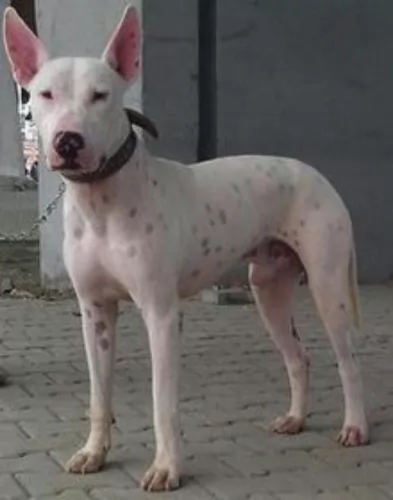 The Gull Terr hails from Pakistan. Having been introduced to the country by the British Raj, the dog has always been valued for its guarding and fighting abilities.
The Gull Terr hails from Pakistan. Having been introduced to the country by the British Raj, the dog has always been valued for its guarding and fighting abilities.
The British army, on bringing English Bull Terriers with them, mated them with local dogs. The dog was in other words, created from the old bull terrier which became extinct, and the Bully Kutta.
The Gull Terr or Pakistani Bull Terrier as he is known is a rare breed of dog. Today they are usually found in rural areas of Pakistan as well as in the Indian Panjab area, becoming popular as both pet and watchdog. It is no longer used for dog fighting as this has been banned.
The Moscow Water Dog was developed in the Soviet Union around the same time as other classic Soviet dogs. The Moscow Watchdog and the Black Russian Terrier are a couple of these other dogs. The Water Dog came from crossing the Caucasian Oytcharka with the Newfoundland. The breed is known by many names including the Vodolaz which means “diver of deep Water”. The Moscow Water Dog was only bred in the Russian state’s Red Star Kennels as working dogs for the military.
Following the second World War, most of the working dogs had been destroyed during the war. Not enough dogs could be imported to begin a breeding program for any working breed. So, the Soviet Red Star Kennels began to create several working breeds. Included in this group with the Moscow Water Dog, were the Moscow Newfoundland, the Moscow Great Dane, the Black Russian Terrier, and the Brudasty Hound.
The only really successful breed coming from this program is the Russian Black Terrier. All the rest are either extinct or found only in Russia today. The Moscow Water Dog was supposed to be a life saver/water rescue dog, but the dogs they developed were too aggressive, and the program was scrapped. It seemed that the cross had bred a dog that had too much of the working water dog traits and not enough of the rescue dog traits. The military breeders tried to pass the dogs off as a Russian Newfoundland and sell it to the non-military.
These non-military owners of the few “Russian Newfoundland”, did not try to change the dogs through breeding. Instead over time they bred the Russian Newfoundland with pure bred Newfoundlands almost eliminating the “Russian” portion of the breed. By the early 1980’s the stock had been so diluted with the pure Newfoundland that the Russian Newfoundland was basically extinct.
The Red Army kennel had other breeds with some of the genes of this breed in their lines. This included the Brudasty Hound, the Moscow Great Dane, the Caucasian Oycharka, the Moscow Watchdog and the Russian Black Terrier. The Russian Navy was unhappy with the situation and never again let the army developed the Navy’s waterdog.
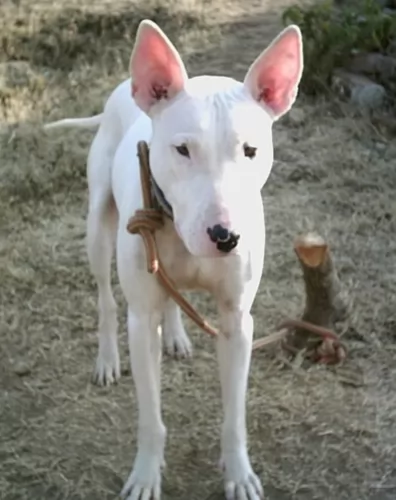 As a medium sized dog, the muscled Gull Terr stands as 45 – 66cm in height and weighs in the area of 40 – 45kg.
As a medium sized dog, the muscled Gull Terr stands as 45 – 66cm in height and weighs in the area of 40 – 45kg.
The dog has a short, smooth coat which is white, but you may find some black spots on him. He has a egg shaped head, ears are naturally erect, dark slanted eyes, and he has a long tail which is held upwards. Muscled and agile, he is a powerful working breed and makes a good watchdog.
This is an aggressive dog breed, and first-time dog owners might want to have a more amicable kind of pet to start off with.
He is a fearless dog, somewhat aggressive and suspicious towards strangers and therefore wants to protect his owner from them. With training and socialization he can be good with children in the home, although he is inclined to be boisterous and stubborn. He has fierce protective instincts, even though he is considered not as aggressive as some other Pakistani dog breeds.
The Gull Terr will need an experienced dog handler. Even though he has been a fighter in his day, he is capable of being an excellent family pet as well. You won't have trouble training him as he is intelligent. He then becomes more obedient and more manageable. He is a very active dog and therefore he won't fit into city dwelling where there are small spaces. He needs a place to run and on top of that he will require a good deal of exercise.
The Moscow Water Dog was intelligent, vigilant, an excellent swimmer, and great in artic waters. However, he was too aggressive and instead of saving the swimmer, they would attack them. The Moscow Water Dog is a tall, balanced and powerful dog. They have a wide muzzle and a square head like the Newfoundland. Their eyes are dark and small while the ears are triangular. The nose and lips are black. He has webbed feet of course and a hanging tail.
The coat on the Moscow Water Dog was of course waterproof and double. The top coat is very dense, straight and soft. It is usually a dark brown with some black and white.
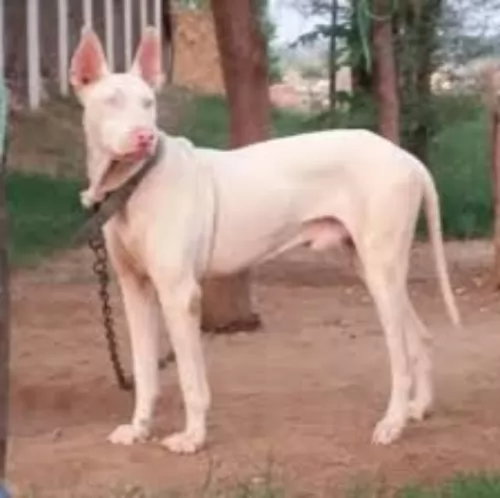 Your Gull Terr love the attention he receives from his human family and he won’t flourish at all if he is put into the back yard for watch dog purposes only. He is a dog that needs to come indoors to be with his family.
Your Gull Terr love the attention he receives from his human family and he won’t flourish at all if he is put into the back yard for watch dog purposes only. He is a dog that needs to come indoors to be with his family.
He tends to be somewhat aggressive and this is why he isn’t looked upon as the ideal pet for first-time dog owners and those with young children in the home.
He is a confrontational dog, willing to enter into a fight with provocation. Strong willed he will require early training and socialization, and when he is brought up by a firm, consistent, kind owner, he can get over his aggression and become a loyal, devoted, protective and loving pet.
yes
Swimming and stamina
Yes but needed some land. Better in countryside.
This is an intelligent dog, but he could not be trained out of his aggressiveness.
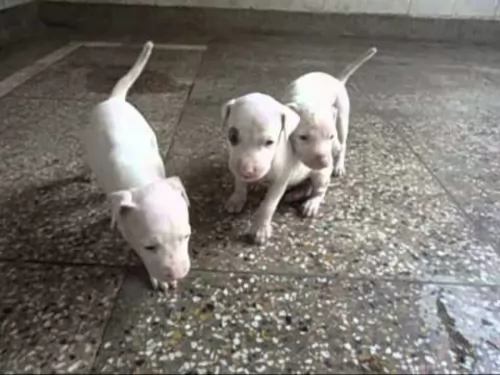 The Gull Terr has a deep chest and this means he is more prone to bloat, a condition known as gastric dilation volvulus.
The Gull Terr has a deep chest and this means he is more prone to bloat, a condition known as gastric dilation volvulus.
Your pet's stomach fills with air and this leads to decreased blood flow to vital organs. The stomach can twist and this is when the condition becomes life threatening as blood supply to the stomach is cut off. Instead of feeding him large meals, feed him smaller meals more frequently.
Deafness in your pet can be temporary or permanent, in one ear or both. There are are so many reasons why your pet could be deaf and it could be a birth defect, an infection or old age. Certain dogs such as the white coated Gull Terr are also more predisposed to congenital deafness.
Get him to the vet who will examine your dog’s ear canal for wax and debris and discuss the way to go for your beloved pet.
Because the breed was around for such a short period there is not a lot of documentation or information regarding genetic or propensity health issues. There are however a few issues that just his heritage and Newfoundland blood would lend itself to.
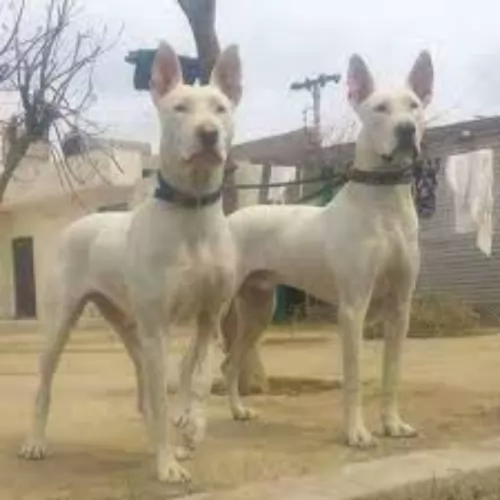 Easy to look after with his short coat, the Gull Terr will only require a brushing twice a week to keep the coat shiny and healthy.
Easy to look after with his short coat, the Gull Terr will only require a brushing twice a week to keep the coat shiny and healthy.
Because his coat is white, it can show dirt easily, and it will simply require taking a damp cloth and wiping the mark off him. You don't want to be bathing him often as this dries his skin out – rather just wipe the coat down.
Your Gull Terr is a highly energetic dog and he loves nothing more than to be involved in robust exercise and games. He is best suited in a home with large grounds and if you do opt to have him in the city, you will have to pay close attention to his exercise needs – lots of walks, runs, ball games, swimming and running with you as you cycle.
You want to be sure that your energetic Gull Terr has a healthy diet full of important proteins, fats, and carbohydrates.
Protein is always important for a dog like this and you want to make absolutely sure that apart from his high quality kibble, you mix in raw meat from time to time as well as cooked chicken, fish, brown rice and vegetables.
When looking for a commercially manufactured dog food, look for high-quality animal protein as a top ingredient. Make sure he always has fresh, cool water available to him.
Required high quality food made specifically for large or giant puppies. Feed 3-4 times a day a total of 21/2 -3 cups.
Required high quality food made for large or giant dog breeds. Feed twice a day a total of 2 cups.
The Moscow Water Dog did not need a high level of exercise, but they did have a lot of stamina. They loved to swim. Not overly active – more of a couch potato.